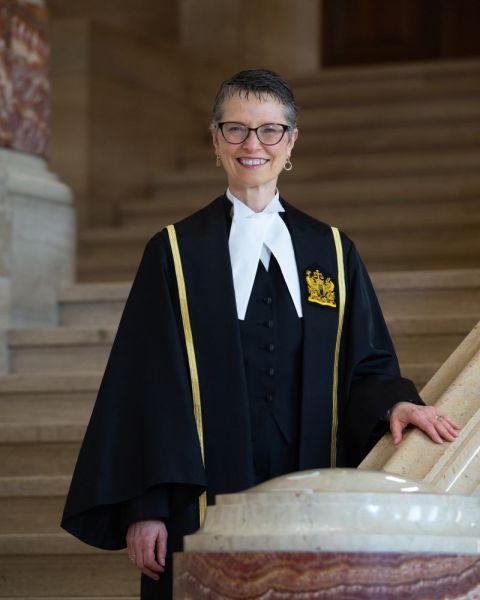
Janet Fuhrer, Law’85, was having a typical busy morning on June 27 as a partner and intellectual property lawyer with the firm Ridout & Maybee LLP (in its Ottawa office). But about mid-day she received a phone call that would change her life. The Honourable David Lametti, Minister of Justice and Attorney General of Canada, gave her the news that she had been appointed to the Federal Court, effectively immediately.
Two things had piqued Fuhrer’s interest in serving as a judge of the Federal Court, which specializes in areas such as intellectual property, maritime law, federal–provincial disputes, and civil cases related to terrorism. “First, I had some familiarity with the Court as a result of my intellectual property law practice, which periodically resulted in appearances before the Court on behalf of clients,” she says. “Second, I had been interacting with members of the judiciary at events such as the Canadian Bar Association (CBA) National IP Section – IP Day and Judges’ Dinner, and in my previous role as the President of the CBA.”
In addition to the CBA, Fuhrer is also a past president of the Intellectual Property Institute of Canada and was one of the first Canadians invited to become a fellow of the American Intellectual Property Law Association. She has served in various leadership roles with all three organizations, and also with the Ontario Bar Association and the International Trademark Association. The Law Society of Ontario had certified her as a specialist in trademarks and copyright. At Queen’s, she taught Trademarks and Unfair Competition Law for a term and served on the Dean’s Council.
Chief Justice Paul Crampton has written, “The Federal Court is committed to addressing two pressing challenges. The first is improving access to justice. The second is modernizing the Court to keep pace with technological change.”
Fuhrer’s experience ties in with addressing these challenges. “The Court has several internal committees devoted to dealing with issues like these and others,” she says. “I anticipate drawing on my many years of committee involvement and leadership with various organizations, including the Queen’s Law Dean’s Council, to assist with these important objectives of the Court.”
Fuhrer was also appointed a judge ex officio of the Federal Court of Appeal (FCA), which reviews the decisions of the Federal Court and Tax Court, and is the highest court in the country for about 95 per cent of all cases. In that role, she may be called upon to hear matters before that Court if there are not enough FCA judges available to form a panel of three. While that is unlikely to occur, if it does, she says, “I am confident that it would be very interesting and would ensure that any unanticipated gaps in the administration of justice are filled as needed.”
What advice would Justice Fuhrer give Queen’s Law students and graduates s aspiring to a career in the judiciary? “There are many possible paths of to a career in the judiciary, whether from private practice, in-house, public service, teaching or some combination,” she says. “When judges visit Queen’s Law, take advantage of any question and answer period to ask about their particular path.
“Consider what court(s) might be of interest and research the criteria for submitting an application; much like applying to law school, there indeed is an application process for prospective judicial appointments in Canada,” she continues. “Also, consider clerking with one or more courts to obtain insight into what a career in the judiciary might involve.”